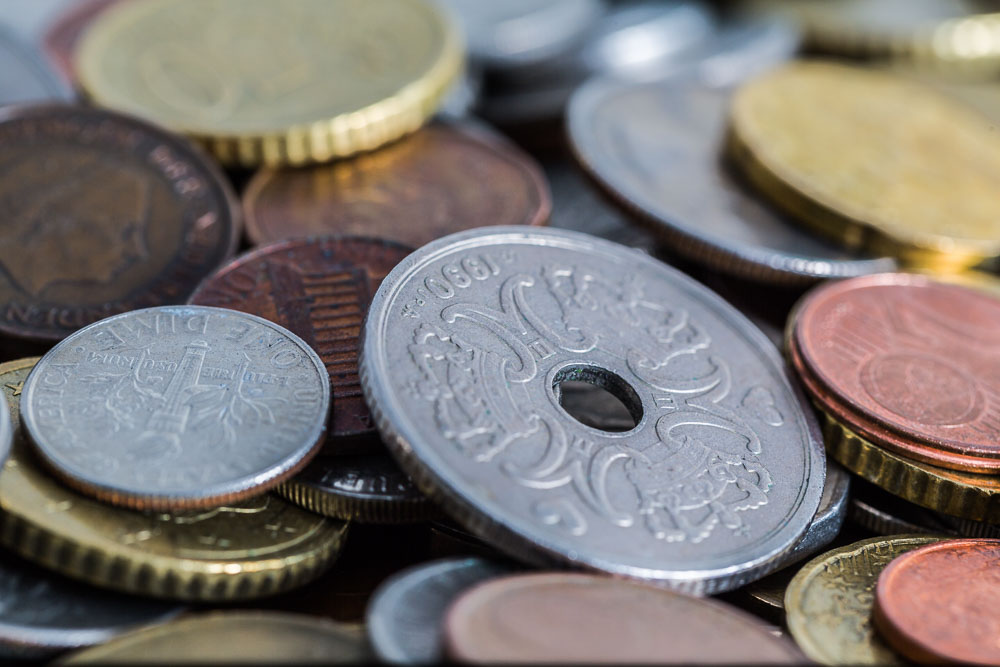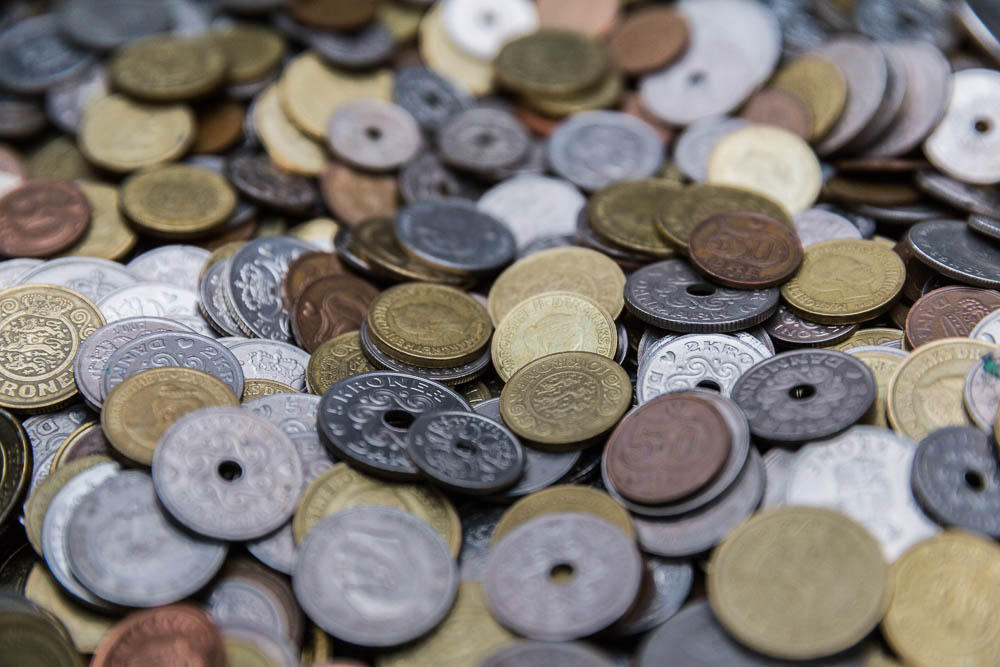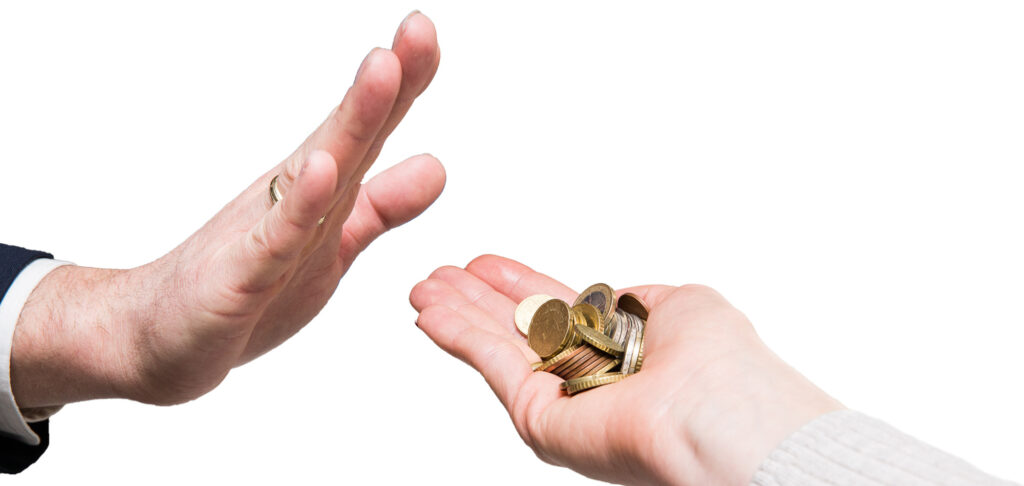At Leftover Currency we exchange foreign coins. You may have wondered why other bureaux de change are keen to exchange foreign banknotes, but won’t accept foreign coins. These five reasons explain why:
1. Notes are more profitable than coins
Bureaux de Change’s profit comes from the difference between the buy rate and the sell rate of foreign currencies, known as the exchange rate spread. They make money by selling currency at a higher price than the original purchase price.People buying currency for travel expect to receive banknotes, not coins. An envelope of banknotes is more convenient for the traveller than a bag of coins! Whilst there is demand to sell foreign coins, there’s significantly less demand to buy them. Because of this, a bureaux that accepted foreign coins for exchange would find it difficult to sell these on to other customers.
So whilst profit could be made on the buy side, it’s generally not profitable on the sell side with foreign coins. Furthermore, because coins have a lower face value than banknotes, what little profit there is to be made applies to a smaller turnover.
Smaller margins, and smaller total amounts makes it is less profitable for a Bureaux to handle foreign coins than foreign banknotes.
2. Dealing with coins involves more work
In addition to being less profitable, working with coins involves more work compared to banknotes. Businesses have to maintain an inventory of their stock, and it’s the same for bureaux de change. At the close of business each day, stock has to be counted.It’s a lot more work to count your inventory of coins than your banknotes. Coins have to be sorted by denomination, and this is very time consuming, especially when it has to be repeated every day for many different currencies. £100 in coins will inevitably constitute a much greater number of coins to sort and count than the number of individual banknotes that make up £100.
3. Coins are heavy and take up space

 Coins are very heavy, which presents logistical challenges. Whilst banknotes can be transported easily because they’re neither bulky nor heavy, coin stock needs to be transported by vehicle, and it can be difficult to move heavy crates of coins from a delivery van to the bureau de change, which are often in locations without immediate vehicular access.
Coins are very heavy, which presents logistical challenges. Whilst banknotes can be transported easily because they’re neither bulky nor heavy, coin stock needs to be transported by vehicle, and it can be difficult to move heavy crates of coins from a delivery van to the bureau de change, which are often in locations without immediate vehicular access.
The majority of bureaux de change are found in places like airports and busy retail streets, where footfall is high but rents are costly. Therefore bureaux de change usually occupy very small premises to keep overheads down so that they can be cost-effective.
Coins take up much more room than banknotes. £10,000 in banknotes could be kept in a drawer, but £10,000 in coins would require crates for storage. For the majority of bureaux, there simply isn’t the room required to store coins.
4. Dealing with coins increases training costs
There is a huge variety of coins within and across currencies. If a bureau de change decides to start taking coins for exchange, it will have to provide extra training to its cashiers. Cashiers need to know the valid coins from the worthless coins. They also require training to understand coin security features and be able to identify counterfeit coins.Staff training needs to be regularly refreshed to ensure that cashiers are aware of the latest changes, for example the recent introduction of a new set of Singapore Dollar coins.
5. Coins require different equipment to banknotes
Dealing with coins requires different equipment to that used for banknotes. Each bureau that accepts coins for exchange will require coin counting machines for each currency.The head office or distribution centre where currency is sent to and from will need to have coin sorters and wrapping or bagging machines as well as coin sorters. Moving large amounts of coins will require a forklift and money transport van. Coin storage necessitates heavy duty storage bays and large safes.
So how does Leftover Currency exchange foreign coins?
Working with coins is less profitable, requires more space, more equipment, more training, and involves more work than working with banknotes. This is why most bureaux de change don’t exchange coins.The costs and complications associated with dealing with foreign coins has created an opportunity for niche companies like Leftover Currency that specialise in the exchange of foreign coins.
How can we do this? We have different rates for coin exchange than for banknotes. This means that customers get less money for selling €100 in coins than they would for €100 in banknotes. The higher spread of coin exchange enables us to offset the greater costs of working with coins, and make a profit whilst providing our customers with a service that gives cash for coins that would otherwise be worthless.
Foreign coin exchange is likely to remain a niche market occupied by only a few specialist bureaux. Whilst the higher spread enables profitability, the extra costs in terms of storage, logistics and training, together with the smaller turnovers associated with coins, make it very likely that the bigger companies in Foreign Exchange will continue to concentrate on banknotes only.

 Loading
Loading